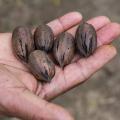Tree Fruit: What are chill hours?
Mississippi's winter chilling information
Deciduous fruits and nuts stop growing in late summer or fall, drop their leaves, go dormant during the winter, and then resume growth in the spring. This relationship between plant and environment is important to the survival of the plant. Growing plants that are non-hardy and incapable of becoming hardy need dormancy during winter for survival. In areas where winters may fluctuate between cold and mild temperatures, species have developed long chilling requirements, so they will not begin to grow in midwinter even though it may warm up to growing temperatures for several days.
Endodormancy (rest) is defined as that period when buds are dormant because of internal physiological blocks that prevent growth even under ideal external conditions for growth. Chilling termperatures above freezing terminate endodormancy. Chilling hours are defined as period of time between 32º F and 45º F. Plants are assigned a certain chilling requirement based on the amount of cold needed to cause 50 percent of the buds to break and flower in the spring. Most blueberries have a chilling requirement of 400-600 hours. Peaches are planted using the chilling requirement as a criteria for variety selection and range from a low of 400 to a high of 1250. Average chilling hours during the winter in Mississippi are: Hattisburg - 400-600; Jackson - 600-800; Mississippi State University - 800-1000; and Holly Springs - 1000-1200.
In 1999, middle to lower Mississippi experienced a low chilling hour accumulation. There is a material (Dormex) that can be sprayed on the commercial plantings that will substitute for about 200 hours. This material is a restricted-use pesticide and can damage the plant if used improperly. Dr. John Braswell, Dr. Frank Matta, and I have asked for, and received, a Mississippi Label for this material.
Dr. Arlie Powell (fruit specialist in Alabama) has performed research and demonstrations with Dormex in Alabama for over 10 years. Information concerning Dormex can be found on their web site, Alabama Winter Chilling
At this time, we feel that we will accumulate sufficient chilling hours in Mississippi. However, some growers may be interested in discussing the use of Dormex in late Febuary.
Publications
News
RAYMOND, Miss. -- Mississippi blueberry producers have two opportunities during February to learn more about production of the state’s largest fruit crop. The Mississippi State University Extension Service is hosting an in-person workshop and a virtual workshop.
RAYMOND, Miss. -- Current and prospective greenhouse vegetable growers can learn about the specialized production method during Mississippi State University’s 2024 Greenhouse Vegetable Short Course on Feb. 27-28. The course will be held at the North Mississippi Research and Extension Center’s Magnolia Building in Verona from 8 a.m. to 5 p.m. each day. It is open to greenhouse vegetable producers throughout the Southeast.
A late freeze, high summertime temperatures and a devastating drought mean a poor pecan crop for Mississippi in 2023.
Eric Stafne, fruit and nut specialist with the Mississippi State University Extension Service, said weather stacked the odds against a good crop this year.



